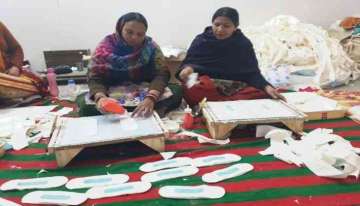Inspired by Akshay Kumar- starrer 'Padman', a 37-year-old resident of Khor village here set up a sanitary pad manufacturing unit, employing 15 women from the area. In a bid to educate women in his village about menstrual hygiene and provide cheap sanitary pads, Bhupendra Khoiwal set up a manufacturing unit in Khor village, 15 km from the district headquarters in Madhya Pradesh. "My family supported my idea and provided financial help for setting up a production unit, which I named after my daughter Aishwarya," Khoiwal told PTI on Thursday.
Aishwarya Enterprises was set up six months ago with an investment of Rs 3.5 lakh, he said. However, convincing women to work with him was an uphill task, and Khoiwal managed to get just 15 on board.
"These pads are economical and a packet of eight pads costs Rs 20," he said, adding that the cost of similar products in the market is Rs 40 per packet. Apart from selling these pads door to door in surrounding villages, his women staffers also raise awareness about menstrual hygiene, Khoiwal said.
Bharti Nagpal, one of the 15 women employed by Khoiwal, said, "We educate women about the advantages of sanitary pads and caution them about the health hazards of using cloth during mensuration." Khoiwal, who has supplied nearly 50,000 pads to vendors in Bhopal, now plans to expand the facility, one of his associates said.
Neemuch district panchayat's chief executive officer Bhavya Mittal has assured her support for this initiative. Only a small percentage of women in India are aware of menstrual hygiene and have access to sanitary pads. Most women in rural areas tend to employ unhygienic methods of protection that can cause serious health risks.
Latest India News
